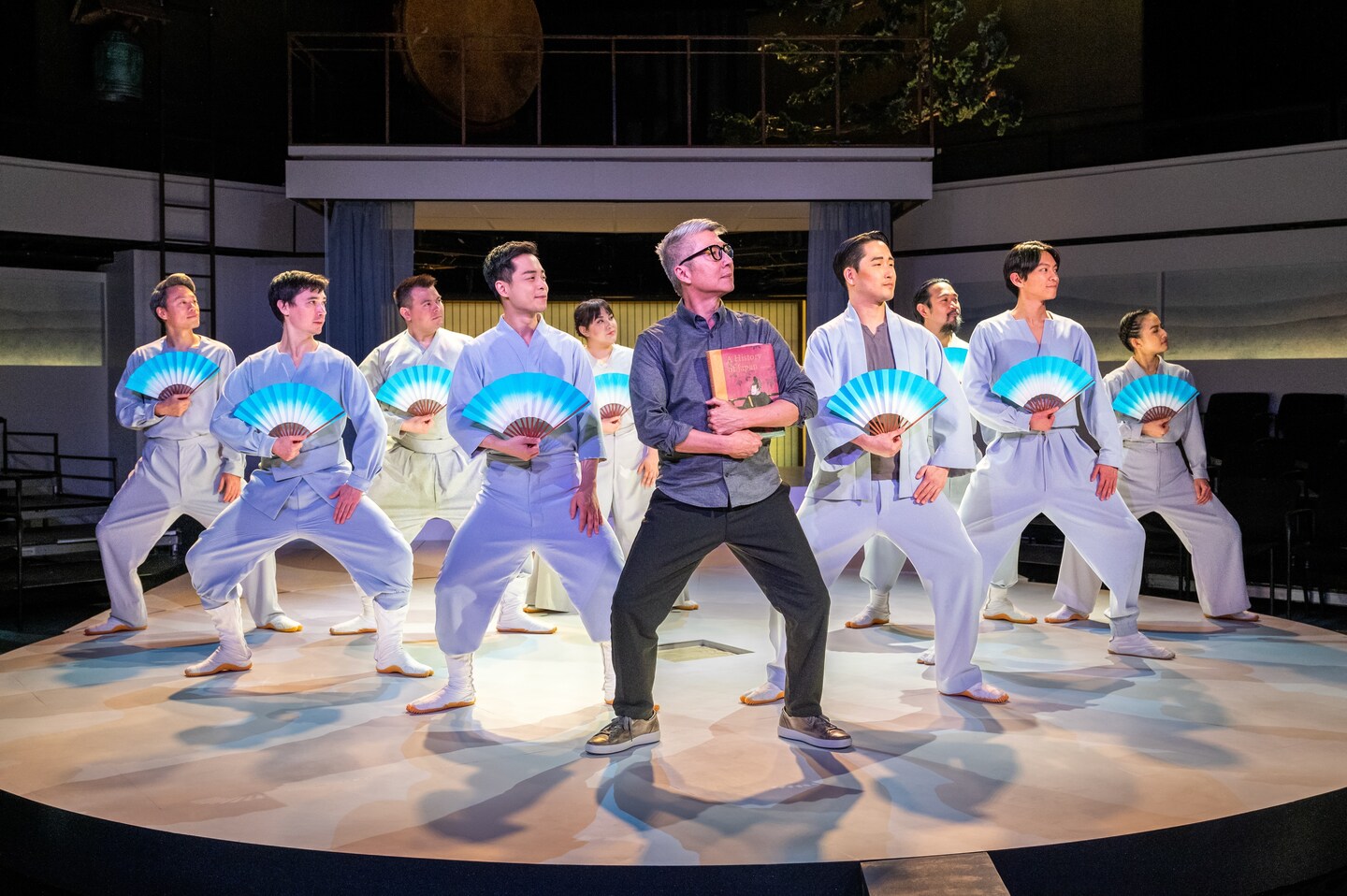[ad_1]
The musical is an East-meets-West parable, ostensibly told from the Japanese point of view, and inspired by an actual event: American commodore Matthew C. Perry’s 1853 expedition to Japan. The most beautiful version I’ve ever seen was performed in Japanese by Tokyo’s New National Theatre at the Kennedy Center in 2002, under the direction of Amon Miyamoto. And the clunkiest occurred in New York two years later, when it was once more directed by Miyamoto, this time in English with an American cast.
Now, Signature Theatre is taking a crack at the 1976 musical, and that somewhere-in-between notion applies to this incarnation, staged by the company’s associate artistic director, Ethan Heard. It’s a good-not-great production that adjusts the musical’s rhythms to the gentle vibe of Jason Ma, the actor in the central role of the Reciter.
This sense of refinement works just fine in the musical’s interludes of delicate poignancy, as in “There Is No Other Way,” a gorgeous ballad sung by the samurai, Kayama (Daniel May), and his deferential wife, Tamate (Quynh-My Luu). Equally beguiling is “Poems,” a roundel of competing haikus by Kayama and Manjiro (Jonny Lee Jr.), the Americanized fisherman who will eventually absorb Japan’s feudal traditions — just as Kayama will abandon them.
But the constantly shifting tone of “Pacific Overtures” demands sharp slashes of satire as much as soft caresses, and those feel flatter than would be optimal. (Perhaps this is in part a vocal or sound issue? Sondheim’s surgically precise lyrics don’t always get the audible emphasis they require.) The deficit of verve seems most apparent in numbers such as “Chrysanthemum Tea” — in which the Shogun’s Mother (Andrew Cristi) slyly solves the problem of a too-passive Shogun (Ma) — and “Please Hello!” a brilliant caricaturing of the craven Western powers that arrive with gifts, and threats.
The musical, after all, is both an indictment of European and American imperialism and a lesson in how the world’s tables can be turned. “Pacific Overtures” was created at a time when Japan was at the pinnacle of its global economic influence, quite the transformation over a little more than a century. “Let the pupil show the master,” the ensemble sings in the evening’s finale, “Next,” the song that propels us to present-day Japan, and a reminder the country has taken its place among the financial superpowers.
Heard’s revival has as its metaphorical hallmark a feature cut into Chika Shimizu’s set, a tiny Zen garden that Ma’s Reciter tends to from time to time. He runs his fingers through the sand to create a swirling pattern, the sense of a Japan existing in eternal equanimity. “Kings are burning somewhere, wheels are turning somewhere: trains are being run, wars are being won, things are being done, somewhere out there. Not here,” the Reciter sings in the opener, “The Advantages of Floating in the Middle of the Sea.”
The tension between an age-old isolation and encroaching globalism plays out in John Weidman’s episodic book and Sondheim’s score, one of his most adventurous. With the aid of Jonathan Tunick’s peerless orchestrations, the songwriter emulates his mentor here, Oscar Hammerstein II, by planting Broadway’s flag boldly in another culture. Sondheim sent us to Sweden in “A Little Night Music” and Britain in “Sweeney Todd” and Italy in “Passion,” but never undertook the role of cultural observer as seriously as in “Pacific Overtures.” (Some may now call this appropriation; Miyamoto’s mastery in a Japanese version suggests universality in the work rather than paternalism.)
The result is a dazzlingly smart and affecting set of 11 numbers that range from the burlesque of “Welcome to Kanagawa” to the “Rashomon”-like brilliance of “Someone in a Tree.” The latter, an account by ordinary witnesses to a historic treaty signing, is staged magnetically by Heard. Some added charm comes in the form of a child-puppet by Helen Q. Huang, who also has designed the production’s array of kimonos and other handsomely rendered traditional costumes.
What loose narrative spine “Pacific Overtures” possesses, in the opposite trajectories of Kayama and Manjiro, is excellently embodied by May and Lee Jr. Chani Wereley, who was so vibrant in last summer’s “A.D. 16” at Olney Theatre Center, here plays to enjoyable effect the Madam who welcomes foreigners to the inexperienced courtesans of her Kanagawa brothel. And Cristi is grandly conspiratorial as a regal matriarch who tries to cook up a cure for a son’s weak response to foreign aggression.
Heard and music director Alexander Tom add novel, flavorful flourishes to the proceedings, such as deploying a massive Odaiko drum that announces its presence in percussive booms. This does not always substitute for the seismic impression “Pacific Overtures” can make. On a generally pleasing evening, a more concerted effort must be undertaken to deliver the musical’s devastating sting.
Pacific Overtures, music and lyrics by Stephen Sondheim, book by John Weidman. Directed by Ethan Heard. Music direction, Alexander Tom; orchestrations, Jonathan Tunick; set, Chika Shimizu; costumes and puppets, Helen Q. Huang; lighting, Oliver Wason; sound, Eric Norris. With Nicholas Yenson, Albert Hsueh, Christopher Mueller, Eymard Meneses Cabling. About 2 hours 20 minutes. Through April 9 at Signature Theatre, 4200 Campbell Ave., Arlington. sigtheatre.org.
[ad_2]
Source link
